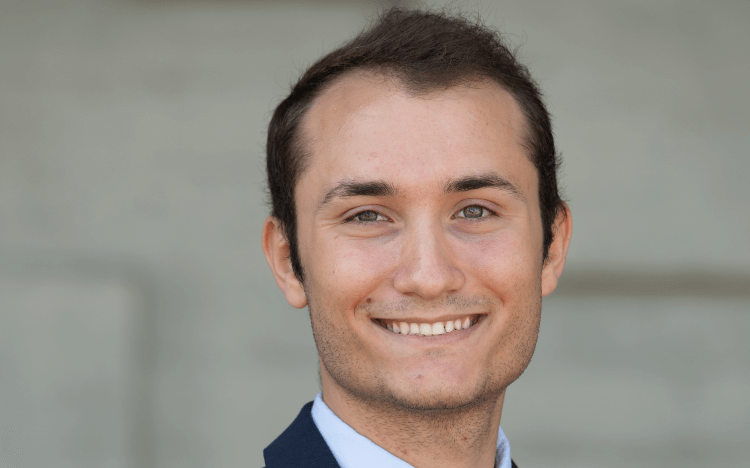A graduate from the top-ranked University of St Gallen Master’s in Strategy & International Management (SIM), Kevin has spent time working with startups in Silicon Valley and took part in an incubator scheme in Israel. In 2022, he participated in the eWorks EdTech Accelerator Program run by Esade Business School's Esade Entrepreneurship Institute (EEI).
Kevin co-founded his first startup in 2019 and since April 2021 he has been the CEO and cofounder of Wyblo, an e-learning platform based in Italy.
BusinessBecause caught up with Kevin to uncover more about his journey to becoming a founder, and to find out his key advice for budding entrepreneurs looking to take the first step in launching a business.
Tell us about you and your startup?
So my name is Kevin Giorgis. I'm originally from Italy and I'm the CEO and co-founder of Wyblo.
Wyblo is a business to business (B2B) education, technology, and future work startup. We provide a platform and infrastructure where training organisations and corporate trainers can run their content. So we are the infrastructure, they run their content on top.
I'm also a board member of EdTech Italia, which was born roughly one year ago and is the Italian ecosystem for education technology. And then on a European level, I am a founding member of the EdTech Garage.
Education technology is more or less the space I’m passionate about.
Every entrepreneur has a problem that they're trying to solve. What was the inspiration that started your journey?
So we all live with a purpose, our purpose as a startup is to elevate training to improve society—the more people are trained and educated, the more individual organisations and society grow.
A bottleneck for this is that there are still lots of manual processes for trainers. So if you have to do 10 hours of manual activity, like making registrations, managing payments, inviting people to the course, informing them and asking for feedback, often you forget the important aspect which is asking before the course, during the course, and after the course: ‘How is it going?’
So we’re simplifying the way live training is done. Providing synchronous training, live and remote from home through a video call, or in person.
What stage were you in your career when you came across this idea and decided to pursue it?
So my first startup was called Edu Enhancement, which was born in 2020. And then April 2021 is when we did an Israeli accelerator programme—the accelerator was our pivot moment.
We finished four months after in July and in that period of time, we started receiving interest from professional training providers who wanted to start getting feedback on their courses.
Then they started asking: ‘Can you make people register for our course? Can they pay for the course? Can you automate the email?’ And so Wyblo became a workflow automation for live training.
How did business school impact your journey as a founder?
I think business schools and even accelerator programs give you a mindset—it’s the way you think, not necessarily the learning content itself.
For me, I'm the CEO and co-founder. I have a chief technology officer, they do the technology part, I have a chief data officer to do the data. And so I have people that cover those areas.
What I do is fundraising strategy and business development, and so it's more the soft skills business school provides that I use. For example: Can you lead a team? Can you interact with your peers or with companies that are bigger than you? It's very much the mindset that gives you.
Business school is challenging, but it allows you to interact with people who are diverse and different from you.
In the St Gallen SIM program, there are a lot of group projects, and everyone comes from a different background. I had a background in marketing and startups, some people were in consulting or in other industries. And so when you come together and you have to do a project, everyone brings different skills.
That also builds the awareness that you can't control everything. So you need a team that brings in the different skills, and you have to be able to collaborate with one another and build healthy competition.
What advice would you have for business school students or anybody else aspiring to become an entrepreneur today?
Well, a lot of the good universities have incubator programmes, that's the way I started.
I wasn't born a founder, I became a founder. The way I did it was firstly through university incubators during my bachelor’s in Bologna, then in California, then a little bit at St Gallen.
So incubators are the first opportunity to get some mentorship, some guidance, maybe some funding as well, not a huge amount but some money that is enough to experiment and start building your network.
How important do you think it is to make an impact as an entrepreneur?
Nowadays, more and more. We increasingly hear terms like ‘impact investing’ or ‘social impact’—investors are pushing it, governments are pushing it, companies are pushing it, hence, startups also need to incorporate it.
A startup doesn't have to be built completely for impact investors by having an ESG perspective, but you need to at least understand that what you do should do good.
It's essential for every startup founder to have that at this point.
Next Read:
7 Ways Entrepreneurs Can Build A Success Mindset







